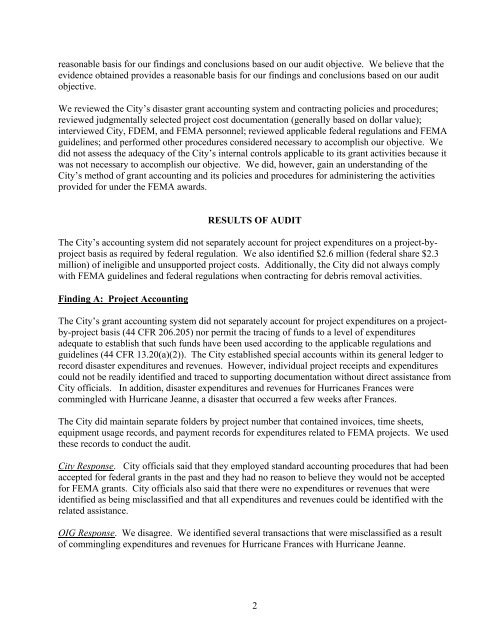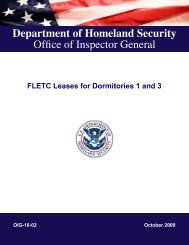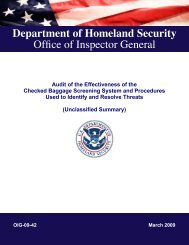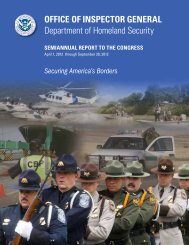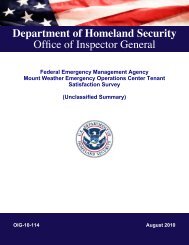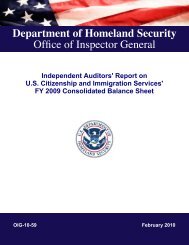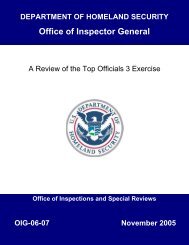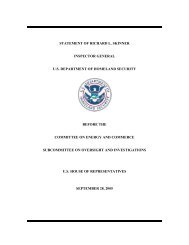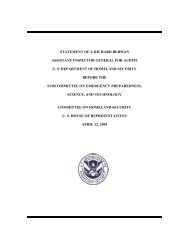City of Vero Beach, Florida - Office of Inspector General - Homeland ...
City of Vero Beach, Florida - Office of Inspector General - Homeland ...
City of Vero Beach, Florida - Office of Inspector General - Homeland ...
Create successful ePaper yourself
Turn your PDF publications into a flip-book with our unique Google optimized e-Paper software.
easonable basis for our findings and conclusions based on our audit objective. We believe that the<br />
evidence obtained provides a reasonable basis for our findings and conclusions based on our audit<br />
objective.<br />
We reviewed the <strong>City</strong>’s disaster grant accounting system and contracting policies and procedures;<br />
reviewed judgmentally selected project cost documentation (generally based on dollar value);<br />
interviewed <strong>City</strong>, FDEM, and FEMA personnel; reviewed applicable federal regulations and FEMA<br />
guidelines; and performed other procedures considered necessary to accomplish our objective. We<br />
did not assess the adequacy <strong>of</strong> the <strong>City</strong>’s internal controls applicable to its grant activities because it<br />
was not necessary to accomplish our objective. We did, however, gain an understanding <strong>of</strong> the<br />
<strong>City</strong>’s method <strong>of</strong> grant accounting and its policies and procedures for administering the activities<br />
provided for under the FEMA awards.<br />
RESULTS OF AUDIT<br />
The <strong>City</strong>’s accounting system did not separately account for project expenditures on a project-byproject<br />
basis as required by federal regulation. We also identified $2.6 million (federal share $2.3<br />
million) <strong>of</strong> ineligible and unsupported project costs. Additionally, the <strong>City</strong> did not always comply<br />
with FEMA guidelines and federal regulations when contracting for debris removal activities.<br />
Finding A: Project Accounting<br />
The <strong>City</strong>’s grant accounting system did not separately account for project expenditures on a projectby-project<br />
basis (44 CFR 206.205) nor permit the tracing <strong>of</strong> funds to a level <strong>of</strong> expenditures<br />
adequate to establish that such funds have been used according to the applicable regulations and<br />
guidelines (44 CFR 13.20(a)(2)). The <strong>City</strong> established special accounts within its general ledger to<br />
record disaster expenditures and revenues. However, individual project receipts and expenditures<br />
could not be readily identified and traced to supporting documentation without direct assistance from<br />
<strong>City</strong> <strong>of</strong>ficials. In addition, disaster expenditures and revenues for Hurricanes Frances were<br />
commingled with Hurricane Jeanne, a disaster that occurred a few weeks after Frances.<br />
The <strong>City</strong> did maintain separate folders by project number that contained invoices, time sheets,<br />
equipment usage records, and payment records for expenditures related to FEMA projects. We used<br />
these records to conduct the audit.<br />
<strong>City</strong> Response. <strong>City</strong> <strong>of</strong>ficials said that they employed standard accounting procedures that had been<br />
accepted for federal grants in the past and they had no reason to believe they would not be accepted<br />
for FEMA grants. <strong>City</strong> <strong>of</strong>ficials also said that there were no expenditures or revenues that were<br />
identified as being misclassified and that all expenditures and revenues could be identified with the<br />
related assistance.<br />
OIG Response. We disagree. We identified several transactions that were misclassified as a result<br />
<strong>of</strong> commingling expenditures and revenues for Hurricane Frances with Hurricane Jeanne.<br />
2


